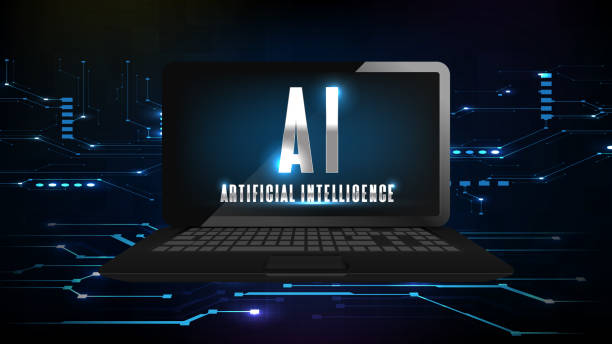A Comprehensive Introduction to Artificial Intelligence

#Artificial_Intelligence, a term widely heard these days, is more than a science fiction concept; it is a growing reality that is changing our world.
#This_transformative_technology, often abbreviated as AI, allows computer systems to perform tasks that typically require human intelligence.
These tasks include learning, problem-solving, language comprehension, and even decision-making.
Since scientists first conceived of building machines that could think in the 1950s, AI has come a long and winding way.
Today, we are in the golden age of this technology, witnessing significant advancements daily.
The main goal of AI is to simulate and mimic human cognitive abilities so that machines can operate autonomously and interact with data in more sophisticated ways.
This includes subfields such as machine learning, deep learning, natural language processing, and computer vision, each playing a key role in the development and advancement of this field.
Artificial intelligence is increasingly present not only in industry and business but also in our daily lives, transforming how we live and work. This technology promises to enhance productivity on a large scale by automating processes, improving accuracy, and increasing efficiency.
Don’t have a company website yet and missing out on online opportunities? With professional corporate website design by Rasawab,
✅ Double your business’s credibility
✅ Attract new customers
⚡ Free consultation for your corporate website!
Types and Modern Approaches of Artificial Intelligence

When we talk about types of Artificial Intelligence, we must understand that this field is very broad and has various classifications.
Generally, AI can be divided into three main categories: Artificial Narrow Intelligence (ANI), Artificial General Intelligence (AGI), and Artificial Super Intelligence (ASI).
Artificial Narrow Intelligence is the most common type present around us today, designed to perform specific tasks, such as Netflix recommendation systems or voice assistants like Siri.
These systems are highly efficient in their specialized domain but cannot use their knowledge from one area to perform tasks in another.
Artificial General Intelligence is the long-term goal of researchers and refers to a machine that can perform any intellectual task a human can.
This type of AI is still in its early stages of development.
Artificial Super Intelligence also goes beyond AGI and refers to a system whose intelligence surpasses that of the smartest humans in all fields.
Modern approaches in AI development also include Machine Learning (Machine Learning) and Deep Learning (Deep Learning).
Machine learning allows systems to learn from data and improve their performance without explicit programming.
Deep learning is a subset of machine learning that uses artificial neural networks with multiple layers to learn complex patterns from large volumes of data, bringing significant advancements in fields such as image recognition and natural language processing.
These specialized approaches are the main driving force behind recent advancements in AI and play a vital role in shaping the future of this technology.
The Role of Artificial Intelligence in Our Daily Lives

The presence of Artificial Intelligence in our daily lives might be more prominent than we imagine.
From our smartphones to smart home appliances and even online shopping, AI has permeated many of our daily activities.
Voice assistants like Google Assistant and Amazon Alexa help us perform tasks with voice commands, navigation systems (GPS) suggest the best routes, and social media algorithms show us content we like.
In cybersecurity, AI helps identify threats and malware attacks.
Even in the entertainment industry, AI is used to generate music, screenplays, and even create video games, bringing entirely new experiences to users.
| Application | Example in Daily Life |
|---|---|
| Voice Assistants | Siri, Alexa, Google Assistant |
| Recommendation Systems | Netflix, YouTube, Amazon |
| Self-driving Cars | Tesla and other automotive companies |
| Facial Recognition | Unlocking phones, airport security |
| Machine Translation | Google Translate |
These examples are just a fraction of the AI applications we encounter daily, demonstrating how this technology has slowly but steadily woven itself into the fabric of our lives.
From the simplest daily tasks to complex decision-making, AI’s capabilities surround us.
This technology helps us operate more efficiently, faster, and smarter, making our lives easier.
The presence of AI systems on news platforms helps us view news that is most relevant to our interests, which is a prime example of AI’s impact on information dissemination and access to news content.
Countless Opportunities and Benefits of Artificial Intelligence

The advent of Artificial Intelligence has opened new avenues of opportunities and benefits across many industries and sectors.
One of the most significant benefits of AI is its ability to automate repetitive and time-consuming processes, leading to a dramatic increase in efficiency and cost reduction.
In manufacturing, intelligent robots can perform tasks with higher precision and speed, while in customer service, chatbots and virtual assistants quickly answer queries and increase customer satisfaction.
In the medical field, AI assists in early disease diagnosis, discovery of new drugs, and even more precise surgeries, all of which can save thousands of lives.
Furthermore, AI is a powerful tool for analyzing Big Data.
Its ability to process and extract patterns from vast amounts of information helps companies gain valuable insights, make better decisions, and implement more effective strategies.
This advantage is crucial in finance, marketing, and even weather forecasting.
Moreover, AI can help solve some of the world’s biggest challenges, such as climate change, food scarcity, and energy shortages.
From optimizing energy consumption in buildings to developing precision agriculture, AI’s potential to create positive and sustainable changes is unparalleled.
This technology guides us through the complexities of the modern world and provides unparalleled analytical opportunities to gain a deeper understanding of issues.
Does your current website reflect your brand’s credibility as it should? Or does it drive away potential customers?
Rasawab, with years of experience in professional corporate website design, is your comprehensive solution.
✅ A modern, beautiful website consistent with your brand identity
✅ Significant increase in lead and new customer acquisition
⚡ Contact Rasawab now for a free corporate website design consultation!
Challenges and Concerns Surrounding Artificial Intelligence

Despite all its countless benefits, the growing expansion of Artificial Intelligence also comes with serious challenges and concerns.
One of the biggest concerns is its impact on the job market.
Many experts predict that with increased automation, many jobs might be lost, which could lead to social and economic inequality.
The question arises: how can we prepare the workforce for a future where AI plays a dominant role?
Another concern is the ethical issues related to Artificial Intelligence.
AI ethics include topics such as algorithmic bias, decision-making transparency, data privacy, and accountability for errors in intelligent systems.
If training data contains social biases, the AI system will learn and reproduce these biases, which can lead to discrimination.
Furthermore, the issue of controlling advanced AI systems, especially regarding strong AI or superintelligence, is a significant philosophical and practical concern.
How can we ensure that these systems operate in humanity’s best interest and not against it? These are questions that the global community must seriously address to ensure the responsible development of AI and properly manage questionable content in this field.
The Amazing Future of Artificial Intelligence and its Prospects

The future of Artificial Intelligence is full of astonishing potentials that can transform various aspects of our lives.
In the coming years, we expect to witness significant advancements in areas such as Generative AI (Generative AI), advanced robotics, and Brain-Computer Interfaces (BCI).
Generative AI is capable of creating new content such as texts, images, and music, which can have profound impacts on creative industries.
Robots with more advanced AI will be able to perform more complex tasks in unstructured environments, from precise surgeries to search and rescue.
One of the most exciting prospects in the future of AI is the development of Artificial General Intelligence, which can think, learn, and solve problems autonomously.
This advancement could lead to the emergence of systems whose intellectual capabilities equal or even surpass those of humans.
Also, on a more distant horizon, the discussion of Artificial Superintelligence and Technological Singularity (Technological Singularity) arises, where machine intelligence advances to such an extent that it completely alters the course of human evolution.
These analytical and news perspectives indicate AI’s immense potential to create a new and different world, one where machine intelligence helps humanity overcome challenges and achieve unprecedented accomplishments.
However, these advancements require meticulous planning and ethical and legal oversight to guide AI’s development toward the public good.
Specialized Applications of Artificial Intelligence in Various Industries

Artificial Intelligence is no longer limited to laboratories; it has become an essential and specialized tool in various industries.
In the healthcare industry, AI is used for more accurate and faster disease diagnosis through the analysis of medical images (such as X-rays and MRIs).
Also, in drug discovery and development, AI significantly accelerates the process through molecular simulation.
In the financial sector, intelligent systems are used for fraud detection, risk management, and personalizing banking services.
These systems can analyze millions of transactions in a fraction of a second and identify suspicious patterns.
The automotive industry has also been revolutionized with the introduction of self-driving cars and Advanced Driver-Assistance Systems (ADAS).
AI in these vehicles processes sensor data to make real-time decisions for navigation, braking, and acceleration.
In agriculture, AI is used for precision farming, crop yield prediction, and optimizing irrigation, which helps increase output and reduce resource consumption.
Even in the retail industry, AI is employed to personalize the customer shopping experience, manage inventory, and optimize the supply chain.
These specialized guidelines and explanations demonstrate AI’s penetration into every aspect of the global economy and illustrate its potential for profound innovations.
| Industry | Main AI Applications |
|---|---|
| Healthcare | Disease diagnosis, drug discovery, robotic surgery |
| Finance and Banking | Fraud detection, risk management, investment recommendations |
| Automotive | Self-driving cars, driver assistance systems |
| Agriculture | Precision farming, crop yield prediction, smart irrigation |
| Retail | Personalized shopping experience, inventory management |
Step-by-Step AI Learning Path

Entering the world of Artificial Intelligence might seem daunting at first, but with a clear learning path and suitable resources, anyone can specialize in this field.
The first step is to strengthen your math and programming foundations.
Familiarity with linear algebra, calculus, statistics, and probability, as well as proficiency in a programming language like Python, is essential for a start.
Python is considered the primary language in AI due to its powerful libraries such as NumPy, Pandas, Scikit-learn, TensorFlow, and PyTorch.
The next step is to learn the core concepts of machine learning.
Numerous online courses from reputable universities like Stanford and MIT, and platforms such as Coursera and edX, comprehensively teach these concepts.
After mastering machine learning, one can move on to deep learning.
This section includes the study of neural networks, Convolutional Neural Networks (CNN) for computer vision, and Recurrent Neural Networks (RNN) for natural language processing.
Applying knowledge through practical projects and participating in Kaggle competitions will help you gain hands-on experience.
This is a training and guidance path for those who wish to enter this specialized field and contribute to AI development.
Are you bothered by losing customers due to your e-commerce site’s outdated appearance or slow speed? Rasawab’s expert team solves these problems with professional e-commerce website design!
✅ Increase customer trust and brand credibility
✅ Stunning speed and excellent user experience
Get a free consultation with Rasawab now ⚡
Artificial Intelligence and the Frontiers of Human Creativity

One of the most fascinating yet controversial topics regarding Artificial Intelligence is its ability to be creative.
Can machines truly be creators, or do they merely imitate patterns? In recent years, we have witnessed astonishing advancements in generative AI that can produce artworks, musical pieces, poems, and even screenplays that are difficult to distinguish from human works.
Tools like DALL-E, Midjourney, and Stable Diffusion are capable of generating high-quality images from text descriptions, and this capability raises new questions about the nature of art and creativity.
In music, AI has given rise to composers who can produce pieces in various styles.
In literature, algorithms write stories and poems that are sometimes emotionally impactful.
However, the questionable content in this area is whether this “creativity” is real or merely a reconstruction and combination of existing data in new ways? Many believe that true creativity requires self-awareness, intent, and human experience, which AI lacks.
Nevertheless, even if AI is incapable of “true” creation, its ability to inspire, accelerate creative processes, and produce new tools for artists is fascinating and undoubtedly transformative, challenging the boundaries of human-machine collaboration.
This is an analytical discussion that will influence the future of art and creativity.
Final Conclusion and the Lasting Impact of Artificial Intelligence

Ultimately, it can be said that Artificial Intelligence is a multifaceted phenomenon with immense potential to positively change our world.
From automating repetitive tasks and increasing productivity to providing new insights from vast data and helping solve complex global challenges, AI will play a key role in shaping a smarter future.
We have seen how this technology has permeated our daily lives, revolutionized various industries, and even expanded the frontiers of creativity.
However, AI advancements are not without challenges.
Ethical issues, concerns about job displacement, and the need for transparency and accountability in the development of intelligent systems are all topics that must be carefully examined.
To maximize AI’s potential and minimize its risks, collaboration among governments, industry, academia, and civil society is essential.
Responsible AI development means ensuring that this technology is used for the benefit of humanity, that individual rights and privacy are protected, and that fair opportunities are provided for everyone.
AI is not only a powerful tool but also a mirror reflecting our values and choices.
The future that AI builds depends on the path we choose for its development and application.
This is an explanatory and analytical summary of the journey we have embarked on with AI, showing that its impact on our lives will be lasting and profound.
Frequently Asked Questions
| Question | Answer |
|---|---|
| 1. What is Artificial Intelligence (AI)? | It is a branch of computer science that aims to create machines capable of simulating human intelligence and performing tasks that require human thinking, such as learning, problem-solving, and decision-making. |
| 2. What are the main types of Artificial Intelligence? | They can be classified into Narrow AI, which focuses on a specific task; General AI, which possesses comprehensive human-like capabilities; and Super AI, which surpasses human intelligence. |
| 3. Name some common applications of Artificial Intelligence in our daily lives. | They include voice assistants (like Siri and Alexa), recommendation systems (like Netflix and Amazon), self-driving cars, facial recognition systems, and spam filters. |
| 4. What is the difference between Artificial Intelligence and Machine Learning? | AI is the broader concept of creating intelligent machines, while Machine Learning is a subset of AI that focuses on enabling systems to learn from data without explicit programming. |
| 5. What is Deep Learning? | It is a subset of Machine Learning that uses artificial neural networks with multiple layers (deep neural networks) to process data and discover complex patterns, used in image and speech recognition. |
| 6. What are the most prominent benefits of Artificial Intelligence? | Improving efficiency and productivity, automating repetitive tasks, making better decisions based on big data analysis, and developing solutions for complex problems in fields such as medicine and science. |
| 7. What are the main challenges facing the development and deployment of Artificial Intelligence? | They include the need for vast amounts of high-quality data, privacy and security issues, bias in data and algorithms, and high development and maintenance costs. |
| 8. Does Artificial Intelligence raise ethical or social concerns? | Yes, it raises concerns related to privacy, algorithmic bias, job displacement due to automation, accountability for errors made by intelligent systems, and the need for a regulatory framework. |
| 9. How can Artificial Intelligence impact the future of the job market? | It can lead to the automation of some routine jobs, but it will also create new jobs requiring advanced skills in the development, operation, and maintenance of AI systems. |
| 10. What are some modern or promising technologies in the field of Artificial Intelligence? | These include advanced Natural Language Processing (NLP) (such as large language models like ChatGPT), computer vision, robotics, and Generative AI. |
And other services of Rasawab Advertising Agency in the field of advertising:
Smart Google Ads: A professional solution for user engagement with a focus on optimizing key pages.
Smart Website Development: A fast and efficient solution for increasing website traffic with a focus on intelligent data analysis.
Smart Advertorial: An effective tool for increasing sales with the help of intelligent data analysis.
Smart Conversion Rate Optimization: A dedicated service for online growth based on the use of real data.
Smart Marketing Automation: A novel service for enhancing customer behavior analysis through user experience customization.
And over hundreds of other services in the field of internet advertising, advertising consultation, and organizational solutions.
Internet Advertising | Advertising Strategy | Advertorial
Resources
An article on Wikipedia Farsi about Artificial Intelligence
? Are you looking for significant growth for your business in the digital world? Rasawab Afarin Digital Marketing Agency, with expertise in SEO, targeted advertising, and secure and professional website design, paves your path to success.
📍 Tehran, Mirdamad Street, next to Central Bank, Southern Kazeroun Alley, Ramin Alley No. 6



